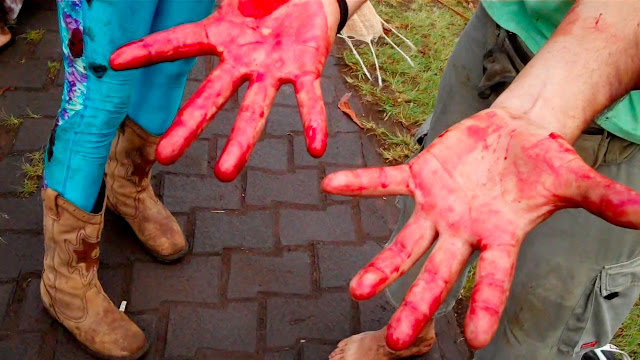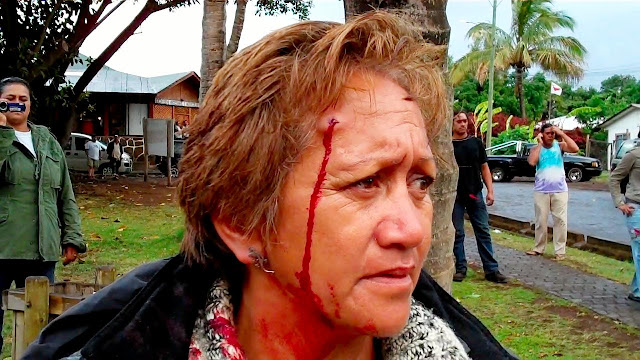L.A. rally to draw attention to violent Rapa Nui evictions
HONOLULU—Acting in solidarity with the Polynesian people of Rapa Nui, the Save Rapa Nui U.S.A. Coalition—an alliance of Asian and Pacific Islander community service groups – is organizing a protest at the Chilean consulate in downtown Los Angeles this morning at 11am. The rally is meant to increase the public’s awareness regarding the violent display of force the Chilean government has used against the indigenous inhabitants since the country’s military forces arrived on the island December 3.
Chile’s severe actions, which have included firing pellet guns and physically assaulting both women and men, are a response to Rapa Nui families’ four-month occupancy of government buildings and commercial properties on the island. The Ma‘ohi (Rapa Nui) have long asserted claims to their ancestral homeland, which the Chilean government annexed in 1888 before proclaiming the isle a “special territory.” Even so, according to law, only Rapa Nui are allowed to hold land titles, but the government has ignored its own legislation by selling parcels to powerful outside business interests. The Rapa Nui say that reoccupying their lands was the only option left to them.
And the resulting carnage stunned the Pacific Islander and Asian community.
“When the violence escalated on that Friday [December 3], it was an extreme act that called for community engagement, said Val LiHang Jacobo, a board member with the Association of Pacific Islander Businesses and Professionals (PACBIZ), one of the organizations involved. “And the response from the community has been overwhelming.”
Several organizations have helped to create signs for the event, including PELE: The Oceanian Sorority and the Cal State University Long Beach Pacific Islanders Association. Representatives from those groups, as well as many others, are set to march in the stormy weather.
“Because of the rain, we’re expecting about 30 to 50 people,” LiHang Jacobo said. “But you never know with the activist community. Sometimes they really show up.”
Nearly three weeks have passed since the initial confrontation, yet communication from those on the island is scarce. Arnie Saiki, an L.A. resident and a friend of Rapa Nui in the struggle, says that the government is limiting Internet capabilities there. “Because it’s [Internet] coming through satellite, they can control the range,” he said.
But what he has heard is that the government has ordered more military personnel there. “If they’ve arrived yet and how many, I don’t know.”
Saiki suggests that for the latest news, people should visit saverapanui.org, which he moderates. Most of the information comes directly from local sources. The latest local post, dated December 16, states that the government is moving forward with evicting Rapa Nui, not just from the buildings they’re occupying, but from their own homes.
In response to the crisis, organizations and politicians the world over have voiced their support for the immediate cessation of violence against the Rapa Nui.
In a statement released last week Monday, Amnesty International declared that, while Chilean authorities have the right to guarantee law and order, “they should do so with proportional use of force, complying at all times with their obligations to respect human rights.” Amnesty urges a full investigation into uses of excessive force and underscores the South American country’s signing of the 1989 International Labour Convention (ILO-Convention 169), which states that indigenous peoples’ fundamental human rights be protected and their cultures preserved.
The Montana-based Indian Law Resource Center, which is currently representing 29 Rapa Nui clans as they seek relief through various international laws, noted that the international community “should be outraged by the human rights violations taking place.” The center also notes that, after informing the agency on October 1, the Inter-American Commission on Human Rights questioned Chile on the legality of its evictions, but the Commission has yet to receive a response.
A group of leaders and academics from Hawaii issued a joint statement urging that the United Nations Secretariat, and numerous other major bodies, put pressure on Chile to recognize its signed commitment to the 2007 UN Declaration on the Rights of Indigenous Peoples. The declaration, which encourages the protection and empowerment of native peoples, asserts that “control by indigenous peoples over developments affecting them and their lands ... will enable them to maintain and strengthen their institutions, cultures, and traditions.” To that end, the group advocates restoring the Maohi (Rapa Nui) to their ancestral lands.
For its part, the Save Rapa Nui U.S.A. Coalition has drafted an entreaty to Arturo Fermandois, the Chilean Ambassador to the U.S. The letter condemns the violence and urges President Sebastian Pinera to return the Rapa Nui to their homelands.
For the latest on the rally and the coalition’s next steps, go to www.pacifikavoice.com.
Related Stories:

Rapanui: Susana Hitorangi, wife of injured journalist Santi Hitorangi, speaks out

Verbatim: ‘The unarmed Rapanui people are determined not to be removed from their lands’

Chilean police shoot and injure Rapa Nui native rights campaigners